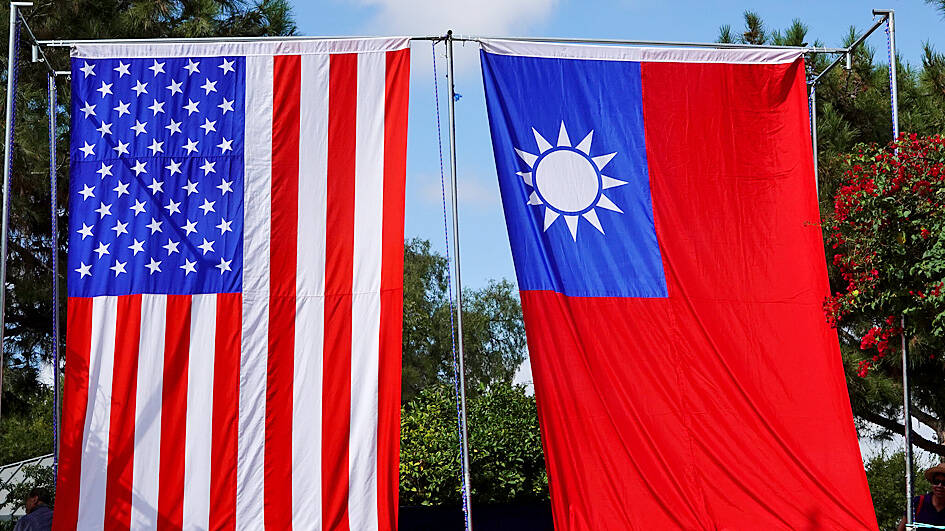Cyberwarfare and the safety of key infrastructure are expected to be the top issues discussed at the annual US-Taiwan Defense Industry Conference, which started in Williamsburg, Virginia, today.
The semi-official three-day conference, which has been held since 2012, is a key event for defense and security officials from Taiwan and the US to exchange thoughts and views on threats and challenges in the Taiwan Strait.
The US-Taiwan Business Council, which organized the event, said that American Institute in Taiwan (AIT) Chair Laura Rosenberger; retired admiral Scott Harbinson Swift, former commander of the US Pacific Fleet; retired lieutenant general Steven Rudder, former commanding general of the US Marine Corps Forces, Pacific; and former US assistant secretary of defense for Indo-Pacific Security Affairs Randall Shriver would be attending the event.

Photo: CNA
The delegation from Taiwan, led by Deputy Minister of National Defense Po Hung-hui (柏鴻輝), includes Su Tzu-yun (蘇紫雲), director of the Institute for National Defense and Security Research’s Division of Defense Strategy and Resources; retired lieutenant general Mike Tien (田在勤); retired admiral Richard Chen (陳永康); and Taiwan Security Analysis Center Director Mei Fu-shing (梅復興).
Panelists are to discuss issues including the Ukraine war, the most serious threats and emerging threats Taiwan faces and supply chain challenges that could negatively affect the ability of the US and Taiwan to meet identified threats.
Other key issues include how the US’ view of Taiwanese defense policy is changing, and how that might change after elections in Taiwan and the US next year.
There are also to be sessions focusing on gaps in Taiwan-US defense cooperation, cybersecurity as an emerging but crucial front in the event of a cross-strait conflict and the role that strategic paralysis of Taiwan’s critical infrastructure might play in a potential conflict.
The conference was held online in 2020 due to the COVID-19 pandemic.
In 2021, Major General Yu Chien-feng (余劍鋒), then director-general of the Defense Mission at the Taipei Economic and Cultural Representative Office in the US, served as Taiwan’s representative to the event.
A delegation was sent to the conference last year for the first time since 2020, led by then-deputy minister of national defense Wang Shin-long (王信龍).

Intelligence agents have recorded 510,000 instances of “controversial information” being spread online by the Chinese Communist Party (CCP) so far this year, the National Security Bureau (NSB) said in a report yesterday, as it warned of artificial intelligence (AI) being employed to generate destabilizing misinformation. The bureau submitted a written report to the Legislative Yuan in preparation for National Security Bureau Director-General Tsai Ming-yen’s (蔡明彥) appearance before the Foreign Affairs and National Defense Committee today. The CCP has been using cognitive warfare to divide Taiwanese society by commenting on controversial issues such as Taiwan Semiconductor Manufacturing Co’s (TSMC, 台積電) investments in the

HELPING HAND: The steering committee of the National Stabilization Fund is expected to hold a meeting to discuss how and when to utilize the fund to help buffer the sell-off The TAIEX plunged 2,065.87 points, or 9.7 percent, to close at 19,232.35 yesterday, the highest single-day percentage loss on record, as investors braced for US President Donald Trump’s tariffs after an extended holiday weekend. Amid the pessimistic atmosphere, 945 listed companies led by large-cap stocks — including Taiwan Semiconductor Manufacturing Co (TSMC, 台積電), Hon Hai Precision Industry Co (鴻海精密) and Largan Precision Co (大立光) — fell by the daily maximum of 10 percent at the close, Taiwan Stock Exchange data showed. The number of listed companies ending limit-down set a new record, the exchange said. The TAIEX plunged by daily maxiumu in just

INVESTIGATION: The case is the latest instance of a DPP figure being implicated in an espionage network accused of allegedly leaking information to Chinese intelligence Democratic Progressive Party (DPP) member Ho Jen-chieh (何仁傑) was detained and held incommunicado yesterday on suspicion of spying for China during his tenure as assistant to then-minister of foreign affairs Joseph Wu (吳釗燮). The Taipei District Prosecutors’ Office said Ho was implicated during its investigation into alleged spying activities by former Presidential Office consultant Wu Shang-yu (吳尚雨). Prosecutors said there is reason to believe Ho breached the National Security Act (國家安全法) by leaking classified Ministry of Foreign Affairs information to Chinese intelligence. Following interrogation, prosecutors petitioned the Taipei District Court to detain Ho, citing concerns over potential collusion or tampering of evidence. The

‘COMPREHENSIVE PLAN’: Lin Chia-lung said that the government was ready to talk about a variety of issues, including investment in and purchases from the US The National Stabilization Fund (NSF) yesterday announced that it would step in to staunch stock market losses for the ninth time in the nation’s history. An NSF board meeting, originally scheduled for Monday next week, was moved to yesterday after stocks plummeted in the wake of US President Donald Trump’s announcement of 32 percent tariffs on Taiwan on Wednesday last week. Board members voted to support the stock market with the NT$500 billion (US$15.15 billion) fund, with injections of funds to begin as soon as today. The NSF in 2000 injected NT$120 billion to stabilize stocks, the most ever. The lowest amount it